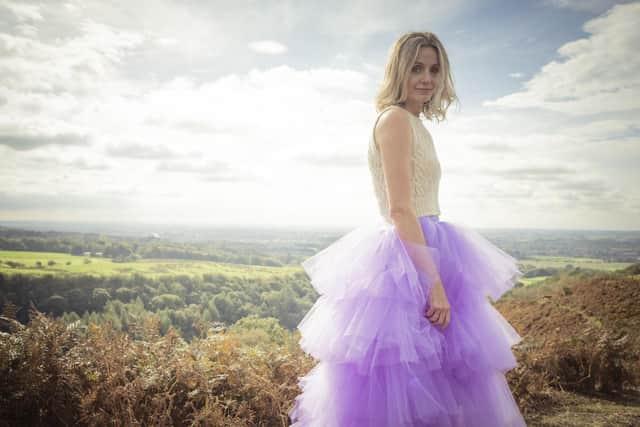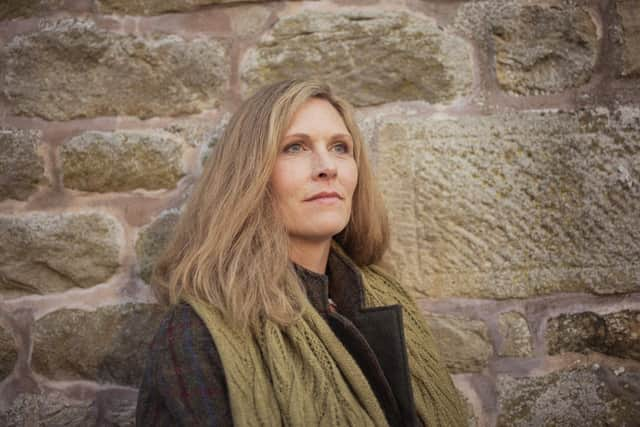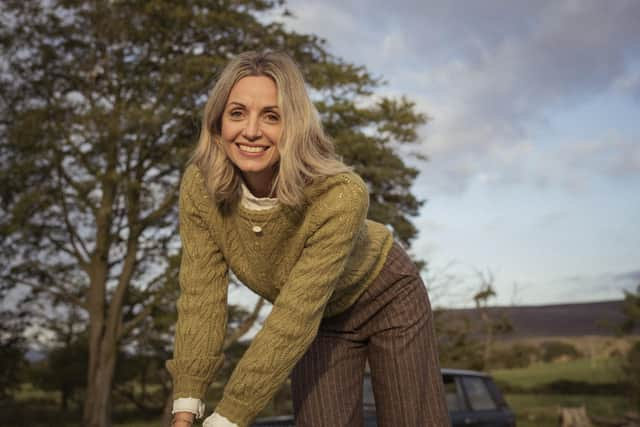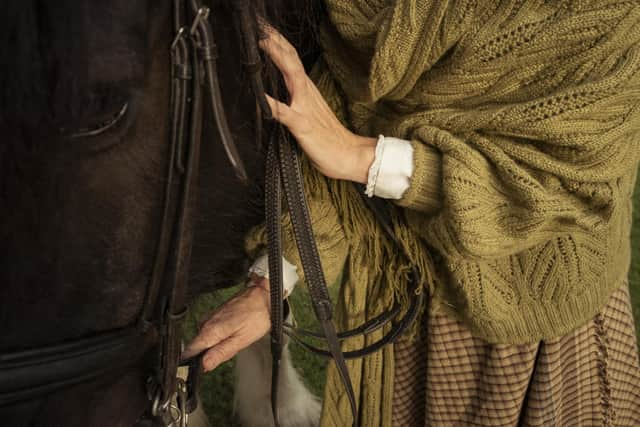Knitwear brand Herd makes knitting yarns and cool folksy jumpers and cardigans using wool from Yorkshire sheep
There is a knack – a secret, even – to creating the softest, finest wool from the fleeces of Yorkshire sheep, and knitwear brand Herd has found it.
Herd makes its own yarn from Bluefaced Leicester sheep that roam the uplands of Yorkshire, Lancashire and Cumbria, spun to DK weight (double knitting yarn, finer than worsted weight yarns and ideal for knitting and crocheting jumpers, cardigans, even baby clothes). It even exports wool to Australia, and says it is comparable in softness with the finest grades of wool from anywhere in the world. Its lustre, it says, is unbeatable.
Advertisement
Hide AdAdvertisement
Hide AdHerd is aiming to reverse the reliance on imported wool, chiefly from China, Australia and New Zealand, and offer a sustainable method of wool production and knitwear manufacture, first by using only British sheep, and then by ensuring their wool is processed within 150 miles of the farm it comes from, using no toxic chemicals or dyes, turning first it into beautiful yarns and then into jumpers, cardigans, vests, scarves and collars in muted yet vibrant earthy tones – these are heritage pieces, and Herd hopes they will be treasured for a lifetime and beyond.


The designs have a folksy edge and the latest collection of womenswear is characterised by signature frills, puff sleeves and scalloped edges. “Our stitches are lace-inspired from my years of hand knitting, but transferred to machine,” says Ruth Alice Rands, who founded the brand in October 2020 after 18 months of research, planning and making.
She takes fleeces from 10 farms in the Yorkshire Dales, including from Leigh and Neil Helseltine’s Hill Top Farm in Malham. The raw wool goes to Bradford for scouring and combing, then is spun in two spinning mills in South Yorkshire to create Herd’s native Bluefaced Leicester yarn.
Ruth says: “The Blue-faced Leicester sheep yield the finest fleece of any sheep in England. They are kept to breed with hill ewes to make strong, healthy lambs well suited to the landscape and climate. They have peaky Roman noses, perky ears, and long lustrous yarn.”
Advertisement
Hide AdAdvertisement
Hide AdShe grew up in Yorkshire, and graduated with a degree in English and French from the University of Leeds University in 2002. Her parents still live in the county. “There is actually a bridge named after my grandfather, John Dronfield OBE, in York,” she says. “He was the headmaster at St Peter’s School for many years, where my mother was born. My grandmother, Sheila Dronfield OBE, was a doctor and magistrate in York.”


After a spell living in San Francisco, Ruth now lives with her family in Gloucestershire. She worked in events for 10 years before starting her first business, Atlantic Kitchen, a wild organic edible seaweed company listed in Ocado and Sainsbury’s. “I’m a bit of a black sheep in my family, being an entrepreneur – everyone else is doctors and lawyers,” she says.
“My biggest inspiration has been the fibreshed movement, which is a blueprint for a sustainable fashion future, started in Northern California, based on the principles of local production and natural fibre and dyes.
“When we were living there, I was knitting a lot and visiting local yarn stores, where I started to understand more about wool’s supply chain. On my return to the UK, I began to research local yarns and uncovered all the building blocks of a fibreshed in Yorkshire, right under our noses yet barely used in favour of imported fibres and offshored production in countries with cheaper labour and less regulation.”
Advertisement
Hide AdAdvertisement
Hide AdHerd operates with a small team of six. All the knitwear is made in Nottinghamshire. The products, including yarns, are sold via the Herd website, and in a few shops across the UK. “The Wyre Collection has a very special place in my heart because it was our first collection, but I am very excited about what’s coming up for autumn/winter 2022,” Ruth says.


The Freckleton range will launch in September, inspired by patchworks of fields of the hills, dales and fells of northern England, and by quilt-making.
“We have seven new knits coming out this autumn - our biggest drop ever - along with two new ground-breaking plant-dyed colour shades,” says Ruth. “We are also working with some brilliant collaborators in the next few months.
“You have to be quite risk-hardy to be an entrepreneur, but my husband and I had a good feeling about the idea for Herd, so we put some of our savings into it. Fortunately, it seems to be paying off.”
Advertisement
Hide AdAdvertisement
Hide AdGreenwashing, she says, is becoming a huge problem for all truly sustainable businesses. “Fast fashion has huge budgets to make customers believe that one half-hearted gesture towards sustainability makes them a beneficial business, which clouds the true impact of non-degrading, polluting, synthetic fibres like polyester, and lengthy, opaque supply chains so that it’s not clear where clothes are made, who by, or how they are treated. They are absolutely reliant on customers not looking behind the label, so it’s so important to research a brand before making a purchase.


“Herd is all about connection, about knowing where your knitwear comes from, who made it and that they were fairly paid. It’s about supporting our rural economy, about the heritage of skills built up over literally thousands of years of sheep farming and wool production in this country,” she says, adding: “It’s about making clothes that are absolutely beneficial, are made completely naturally with no chemicals, no plastic and no pollution. It’s about farming, paying farmers properly for their wool and valuing what they do. But it’s also about joy, about wearing a beautiful cardigan that makes you feel good, and puts a spring in your step.”Website: herdwear.co
